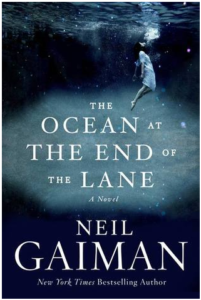The Ocean At The End Of The Lane
Neil Gaiman
(Synopsis taken from GOODREADS)
Sussex, England. A middle-aged man returns to his childhood home to attend a funeral. Although the house he lived in is long gone, he is drawn to the farm at the end of the road, where, when he was seven, he encountered a most remarkable girl, Lettie Hempstock, and her mother and grandmother. He hasn’t thought of Lettie in decades, and yet as he sits by the pond (a pond that she’d claimed was an ocean) behind the ramshackle old farmhouse, the unremembered past comes flooding back. And it is a past too strange, too frightening, too dangerous to have happened to anyone, let alone a small boy.
Forty years earlier, a man committed suicide in a stolen car at this farm at the end of the road. Like a fuse on a firework, his death lit a touchpaper and resonated in unimaginable ways. The darkness was unleashed, something scary and thoroughly incomprehensible to a little boy. And Lettie—magical, comforting, wise beyond her years—promised to protect him, no matter what.
A ground-breaking work from a master, The Ocean at the End of the Lane is told with a rare understanding of all that makes us human, and shows the power of stories to reveal and shelter us from the darkness inside and out. It is a stirring, terrifying, and elegiac fable as delicate as a butterfly’s wing and as menacing as a knife in the dark.
Richard’s views
This book was a novel experience for me, no pun intended. I do not read mythology, fairy tales as a practice. I even avoid horror stories, vampire, Dracula type of fiction. I really don’t know why. It may be that I have a vivid imagination or did when I was younger and so I frighten easily after reading such stories. I pass on watching horror movies on TV because my mind responds so readily to the manipulation of the movie story teller.
At first glance, as I begn reading this book, I thought it was not my type of story. However, as a member of a book club for which this book was designated reading, I persevered feeling obligated to the club. Soon after, I found the tale engaged me. I think it was when he talked about the opal miner and his kitten being killed. After that point, I was drawn into the story, more and more. With the introduction to Lettie and her mother and grandmother, my curiosity was piqued. How could a large homestead such as that of the Hempstock’s be maintained solely by women. Where were the men? With the dead body being discovered in the Mini down the lane, the story became more engaging and when he was met by Lettie Hempstock and take back to their homestead, I was hooked.
By this time, the book became a “page turner” which I could not set aside. I don’t know if I was yanked into the story when the young boy of the story wakes up because he is choking on a silver coin or when the boy tries to extricate the worm from his foot. This was a story of spirits, of fantasy, of the supernatural, told in a suspenseful and enthralling manner. It pulls one back in time to when the reader was seven years old. It reminds the reader of how youngsters permit their imagination to direct their minds. It criticizes adults for not exploring, not involving themselves in the mysteries of the world in which they live.
Lettie, just a few years older than the boy of the story, becomes his guardian angel, his protector from the evil spirits that reside nearby. Soon, the story unfolds as a conflict between the evil spirits who want to kidnap the boy to their world and Lettie who was to protect and safeguard the boy from being kidnapped so and lost forever.
The writing style
When the battle between the evil spirits and Lettie and her allies, her mother and grandmother begins the book becomes a suspenseful barn burner. The suspense escalates moment to moment. Who will be victorious? Will the Hempstock women lose the battle to the powerful malevolent spirits? One cannot resist reading on the story is so engaging and suspenseful.
Gaiman must be praised for such polished writing. He captures the spirit and nuances of a young boy’s way of thinking, his way of phrasing things, his way of talking. The reader can’t help but agree with every facet of Gaiman’s dialogues, from how the young speak, to the language and words used by the adults. The father and mother are absolutely believable in the way they evolve from being non-supportive of their son, to becoming opposing forces seemingly allied with the evil spirits trying to kidnap the boy. The father’s adultery with the new housekeeper seems so plausible. The young boy’s fears and dislike of the new housekeeper so believable.
When the final battle is engaged at the climax of the book, the tension and suspense crescendos with the climactic questions and anxiety of who will win? I could not put the book down once I reached this point of the story.
The final word
This is an amazing story, made so by Gaiman’s literary craftsmanship being honed to the sharpness of a Samurai’s sword. Reading the book once was very entertaining and satisfying. However, as I glance at odd pages, varied passages, I find I am drawn in once again.
I think I must read the book again…even if it is very quickly. But the blanket of its warmth, the irresistibility of its verbal engagement needs to be experienced once more.









